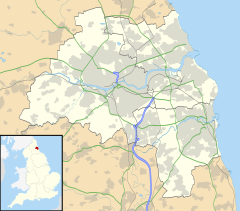Swalwell
Swalwell
Human settlement in England
Swalwell is a village in Gateshead, Tyne and Wear, England, in the United Kingdom.
| Swalwell | |
|---|---|
Location within Tyne and Wear | |
| Population | 3,200 (2001) |
| OS grid reference | NZ203622 |
| Metropolitan borough | |
| Metropolitan county | |
| Region | |
| Country | England |
| Sovereign state | United Kingdom |
| Post town | NEWCASTLE UPON TYNE |
| Postcode district | NE16 |
| Dialling code | 0191 |
| Police | Northumbria |
| Fire | Tyne and Wear |
| Ambulance | North East |
| UK Parliament | |
| |
On 27 August 1640, an encampment of soldiers was gathered in the fields north of Whickham church on the slope down to Swalwell. This was part of the Royalist army of King Charles I preparing to fight the Scots. Information was soon received that the Scots led by General Leslie were crossing the river at Newburn to attack the English at Stella, after which the Whickham contingent would be threatened, and so orders were given to burn the camp at Whickham rather than let it fall into enemy hands. Many of the villagers of Whickham joined in the retreat which followed. The fire at the camp ignited a seam of coal which apparently burned for several years in various places including the Coaly Well. On 7 September 1648 a burial took place at Whickham churchyard of a soldier in Oliver Cromwell's army which was then camped north of the church. Cromwell is supposed to have stayed in Whickham for two days before marching to Scotland down Clockburn Lane on 25 July 1650 on his way to the battle of Dunbar, crossing the Tyne at Newburn and using the ancient route of the cattle drovers.
In 1870–72 Swalwell had a population of 1,479. There were 190 houses, chapels of United Presbyterians, Wesleyans and Primitive Methodists, and extensive ironworks.[1]
The following notable people were either born in Swalwell or lived there for a significant period:
- Jimmy Armstrong – professional footballer
- Harry Clasper – professional rower
- Margaret Dryburgh – a school teacher and missionary who was interned by the Japanese in World War II
- Charlton Nesbit – wood-engraver
- William Shield – Master of the King's Music
This Tyne and Wear location article is a stub. You can help Wikipedia by expanding it. |
